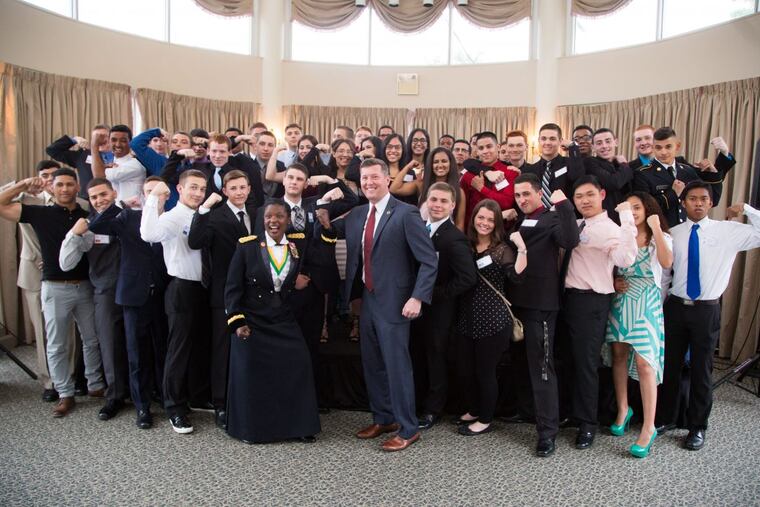When celebrating high school seniors, don't leave out military-bound students | Opinion
Less than 30 percent of all high school seniors could even qualify to serve in the military.

April marks the beginning of when 1.8 million college-bound high school seniors will decide on which college to attend in the fall, followed promptly by their parents proudly telling their friends, family, and co-workers of their child's decision, and ending with their high school publishing the list of elite institutions attended by the Class of 2018.
Left virtually out of the conversation, with little fanfare or public recognition, are the 150,000 high school seniors nationwide who are not college-bound, but rather military-bound immediately after graduation.
These young adults — who represent less than 1 percent of all high school graduates — and their parents are often overlooked by school officials, or even worse are often made to defend their decision, as was the case last month at El Rancho High School in California, where a teacher of a Marine Corps-bound senior verbally humiliated him in class, stating that "only dummies go into the military."
It is no wonder why the parents of military-bound seniors may go "underground" at this time of year. They are tired of defending their child's decision to serve our nation. This happens especially in suburban communities, where nearly all the parents have college degrees and where 90 percent or more of the graduates go on to four-year colleges.
But here are a few facts that educators and parents, including those of military-bound seniors, should know:
Less than 30 percent of all high school seniors could even qualify to serve in the military. Most (sadly) couldn't meet the physical fitness requirements, couldn't pass a drug test, and/or couldn't score high enough on the military examination (ASVAB) to enlist.
Nearly 75 percent of all new enlistees out of high school will only serve one tour of duty; normally 48 to 60 months. So, before many of their fellow classmates graduate from college (six years, on average), these young adults will be separating from the military, entering college with academic credits earned for their military service, and using their earned GI Bill educational benefits to attend college at no or very low cost. Furthermore, their GI Bill benefits will also provide them with a $1,000- to $1,500-a-month living allowance for an apartment or home near campus.
Students who are veterans have already learned how to work in teams, are more likely to graduate from college, tend to have higher GPAs, and earn more academically rigorous college degrees than their non-veteran counterparts.
Military-bound high school seniors will not only typically graduate from college debt-free, but will enter the workforce with four or more years of meaningful work experience, and some will possess security clearance credentials that may put them at the head of the line for careers with companies doing work with the federal government.
Nearly 80 percent of all military occupational specialties are non-combat-arms related. In other words, most military jobs are far from the battlefield and on secured installations that are statistically less dangerous than many college campuses.
So, this month, when you meet high school seniors who plan to enlist into the military after graduation, or their parents, please say thank you for their selfless decision to serve our nation. For without their willingness and desire to stand guard for the next few years, other children wouldn't have the freedom and privilege to pursue their dreams, including attending college this fall.
Kenneth E. Hartman, a former Army officer, is the founder and president of Our Community Salutes (OCS), a national nonprofit organization that honors military-bound high school seniors. OCS ceremonies are conducted throughout the country, including Philadelphia (May 3), Bucks and Montgomery County (May 7), Camden County (May 15), Gloucester County (May 3), Burlington County (May 23), and Wilmington (May 23).